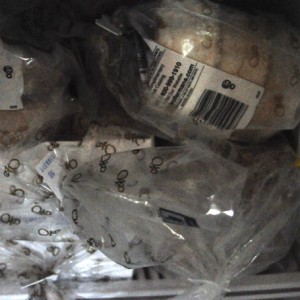I found my freezer door standing open when I went out to the garage to get a frozen dish to go with corn on the cob one day last week. First, I noticed the water in the tray in the bottom, then I touched the warm box of veggie samosas. I understood that I wasn’t going to be adding a dish to the dinner, nor would I be eating dinner any time soon.
While I was pulling wet plastic bags filled with limp food out of the freezer, I thought about the habits that led me to have to throw out numerous bags of thawed fruit that I had spent a lot of time and effort preparing for freezing three years ago. Why didn’t I eat the peaches I sliced and froze on baking sheets to keep them from freezing into a big glob? Why did I still have individually wrapped pieces of a cake that I worked weeks to perfect two years ago in the pile that was heading for the trashcan?
I spend time and money to prepare dishes ahead. I don’t like to overindulge, so I freeze small portions of delicacies that come in larger quantities than I want to eat at one sitting. Then, I keep them. And keep them. And keep them…
Recently, I read some research on gender, money and power, that helps me to understand my quirky freezer behavior. Maddy Dychtwald’s research, published in Influence: How Women’s Soaring Economic Power Will Transform Our World for the Better, found that women often believe that one day they will be poor (26). We tend to adopt defensive investment strategies to stave off the spectre of want, viewing money as a means to security.
Most men, however, see money as a means to freedom, according to Dychtwald’s research. The confidence men feel makes them more willing to invest aggressively because they believe they really will get rich one day.
Dychtwald also observed that many more women than men stash money in secret places, “as a hedge against economic disaster (27).”
My freezer behavior – both creating the food stash and guarding it for the long term – could stem from a defensive position I maintain toward my resources in general. I buy berries in-season and freeze them. I keep the frozen berries because I might not have the money to buy them again in the future.
I want to make sure I’ll always be able to eat what I love, and instead, I end up with spoiled food years after enjoying only a fraction of the tastiest treats. In the end, I lose because I hold on too long.
Dychtwald says that the fear of poverty is strong among women at all income levels. Like many other women, I experience “delusions of poverty,” as one of her survey respondents called this attitude. I can let the delusions continue to guide me unconsciously, or I can make conscious decisions in light of my self-knowledge. I’m going to eat as well as stash.


by Chronic Mom
24 Aug 2011 at 22:56
I grew up in a family of seven, so I learned to cook in large portions….never have recovered from that. Leftovers were a second-day mainstay, and may have stemmed from the same “delusions” you mention above. I’m working on thinning out my pantry these days. NPR ran a piece today on how simplifying one’s life is related to the Japanese wabi-sabi aesthetic. Needless to say, I fell in love with the word and the concept. Great post!
by Christine
29 Aug 2011 at 18:09
Would it help you if you kept a list of what you are freezing? When I make batches of food to freeze, I make lists of what I have so that I am reminded that it’s there. This won’t address the initial behavior, but it will remind you that you have lovely treats available all of the time.
by GadgetGrl
31 Aug 2011 at 10:30
I have a period of time at the end of summer when I am thinking about soup weather and making a lot of freezable soups that I stop purchasing and just eat from the freezer and pantry so that I can have a blank freezer space to fill up with new delectables. I also am greatly facilitated in this endeavor by a label machine that I use to make multiple labels with the same information for my various sizes of containers. This means I can look forward to a delicious soup without being surprised. It also means, if I label it V, B, C that I don’t have to remember what type of stock is in each container so I have vegetarian offerings for my vegetarian friends. Helps those of us whose minds are full of more important things
by UPLives
24 Sep 2011 at 22:51
What a great idea!